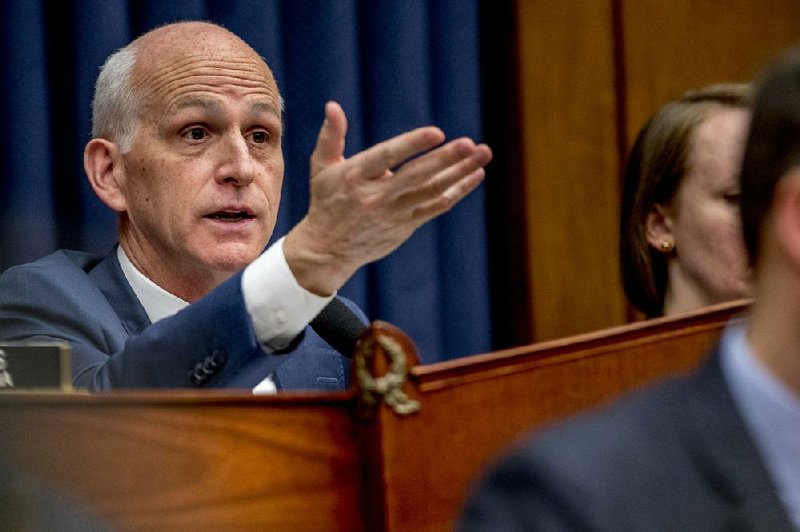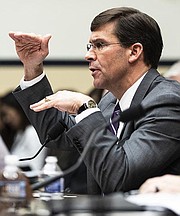WASHINGTON -- Lawmakers from both parties told Pentagon leaders Wednesday that the Defense Department is undermining its own efforts to get military money by diverting billions of dollars for the construction of a U.S.-Mexico border wall.
The chairman of the House Armed Services Committee and the committee's top Republican warned Defense Secretary Mark Esper that overturning congressional funding decisions to shift money for the wall is a big problem that will have consequences.
The plan to shift money has triggered Republican opposition to one of President Donald Trump's priorities.
Rep. Mac Thornberry, R-Texas, said the result may be that Congress will place greater restrictions on the Pentagon's ability to move money around to meet military needs. The chairman, Democratic Rep. Adam Smith of Washington, said the money transfer is "very, very damaging to the Pentagon."
[Gallery not loading above? Click here for more photos » arkansasonline.com/227esper/]
"The message it sends is the Pentagon has plenty of money," Smith said, adding that it "undercuts any arguments for any need for resources."
The Pentagon announced this month that it was slashing billions of dollars in funding for Navy and Air Force aircraft and other military programs to free up money for construction of the wall.
Esper approved the $3.8 billion border wall request from the Department of Homeland Security, and the Pentagon acknowledged that more cuts could be coming to provide additional dollars for the wall. Trump has repeatedly claimed that Mexico is paying for his promised wall, but that has never happened.
The Pentagon's decision, announced in "reprogramming" documents provided to lawmakers, stripped money from aircraft and procurement programs that touch Republican and Democratic districts and states.
Pointing to the $1.5 billion stripped from National Guard programs, Rep. Elissa Slotkin, D-Mich., said she's "concerned the Pentagon is going to become the piggy bank for any pet project. Today it could be the wall, tomorrow it could be someone's decision to fund a health care project."
Slotkin, a former senior policy adviser at the Pentagon, told Esper that, "you leave us no choice but to look at what we can do to constrain your reprogramming authority."
SHIFTING FUNDS
Esper defended the shift in funds.
Esper said the money was shifted from programs that had more money than needed or had money that wasn't needed right away. As an example, he said if the department sought funding for three F-35 fighter jets and Congress decided to fund five, the money for the additional two would be considered "excess."
Congress, which has final budget authority, often makes changes to budgets requested by various departments including the Pentagon, and adds money to programs that lawmakers deem important. Esper's comments set off alarms for those who worry that their budget authority is being usurped.
"The president has determined that we have a national emergency on our southwest border, that to deal with that emergency, that we need a barrier system," Esper said, and that "requires the support" of the Pentagon.
Democratic Rep. John Garamendi of California later rebuked Esper. "Apparently, you're not listening" to comments on "the ripoff and the disregard that this administration has with regard to the Constitution," he said.
Lawmakers also noted that the U.S.-Mexico border is not included as a priority at all in the Pentagon's new national defense strategy. Esper said homeland security is a priority and noted that many things aren't listed in that strategy.
Esper went before the committee calling on Congress to support "tough decisions" needed for the Pentagon to hold spending virtually flat in the coming year while seeking to make U.S. forces better able to confront China and Russia.
The budget request of $705.4 billion for fiscal 2021, compared with the current year's enacted amount of $704.6 billion, "does not keep pace with inflation," Esper said. "Given this flattened funding level, we were required to make many tough decisions to ensure our highest priorities were adequately funded," he said.
With funding increases for nuclear modernization, the new Space Force and hypersonic weapons, among others, Esper said the Defense Department will seek congressional support for expanding reviews that he has said helped generate about $6 billion in savings over the past year.
Esper said in prepared remarks that Congress needs to commit to ending support for outdated "legacy systems." Lawmakers whose constituents benefit from producing them often insist on keeping such projects alive.
NAVY FLEET SIZE
Esper was pressed by lawmakers about the appropriate size of the Navy fleet and its fiscal 2021 request for eight new vessels, two fewer than had been planned for the coming year.
Esper said he not only supports Trump's stated goal of 355 vessels by the 2030s but "I actually think we need more," but not at the expense of creating a "hollow" force. The service has 293 deployable ships today.
Still, Esper said he also supported the Navy's fiscal 2021 move to shift dollars into "readiness because of the challenges they've had getting ships to sea" and "operationally available."
Despite congressional opposition, Trump faced no consequences when making similar transfers last year, when the Pentagon canceled dozens of military construction projects to free up $3.6 billion and transferred $2.5 billion in counterdrug money.
All together, Trump has obtained just over $3 billion for border barrier construction by working through regular congressional channels, subject to limitations imposed by lawmakers. He has used various transfer and emergency authorities to shift almost $7 billion more from the emergency declaration, from a forfeiture fund containing money seized by law enforcement and from funding for military counterdrug activities.
Specifically, the plan targets money for more than a dozen aircraft, including two F-35 fighters sought by Texas Rep. Kay Granger, the top Republican on the House Appropriations Committee, and other members of the Texas congressional delegation.
It also cuts money for eight Reaper drones, four Air Force C-130 transport aircraft, two Marine V-22 Osprey helicopters and for amphibious ships, National Guard equipment and Army trucks.
Information for this article was contributed by Lolita C. Baldor of The Associated Press and by Glen Carey and Tony Capaccio of Bloomberg News.
A Section on 02/27/2020

